MAC opens ‘Camp Counties’ for summer webinars
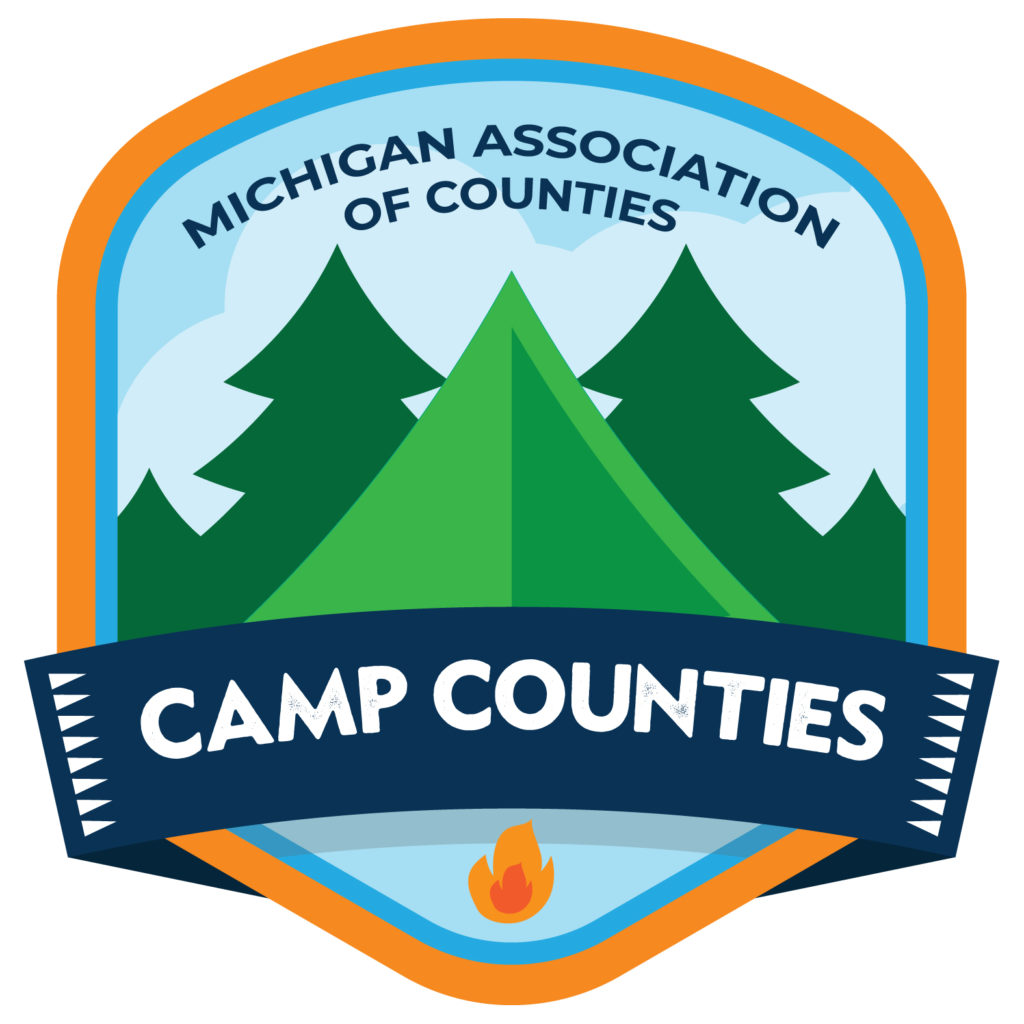 With in-person gatherings still discouraged, but the need to share information and best practices never more acute, MAC has responded with a new educational series for summer 2020: Camp Counties.
With in-person gatherings still discouraged, but the need to share information and best practices never more acute, MAC has responded with a new educational series for summer 2020: Camp Counties.
Replacing our traditional in-person Regional Summits, the webinars of Camp Counties are free to all employees of MAC member counties and designed to provide practical information and tips that can be put to immediate use. All webinars will start at 11 a.m. on their scheduled dates. The webinars will be recorded for post-event, on-demand viewing on our website.
“The five topics are designed to both provide something of an interest to members across the state and deliver practical information that can be put to immediate use as we all continue to navigate the COVID crisis,” said Stephan Currie, MAC’s executive director. “I’m also pleased that we are able to deliver so much to members at no additional costs to them or their counties.”
Major support for Camp Counties comes from Enbridge and Envirologic, with additional support from three of MAC’s sponsored programs: Blue Cross Blue Shield, Nationwide Retirement Solutions and Abilita.
For all the latest camp happenings, visit the Camp Counties page on the MAC website.
June 10: Benzie’s Broadband Journey and Funding Challenges Looking Forward
June 17: Planning and Winning Millage Elections in a COVID World
June 24: Using Uniform Fees to Boost Appeals in Criminal Cases
July 8: How Will COVID Affect Community and Work Life in the Months Ahead?
July 15: Basic Steps for Counties to Enhance Election Cybersecurity
For additional details on each webinar, review the camp agenda flier.
Legislators look to delay summer property tax payments
 A two-bill package intended to provide taxpayers extra time to pay their summer 2020 tax bill without penalty was discussed before the House Committee on Local Government and Municipal Finance this week.
A two-bill package intended to provide taxpayers extra time to pay their summer 2020 tax bill without penalty was discussed before the House Committee on Local Government and Municipal Finance this week.
House Bills 5761 and 5810, by Rep. James Lower (R-Gratiot), are meant to assist businesses and property owners with cash flow concerns resulting from the COVID-19 pandemic and subsequent Executive Orders. Similar bills, Senate Bills 933-934, have been introduced in the Senate by Sen. Peter MacGregor (R-Kent).
The bills aim to waive late charges and penalties for taxpayers who do not make their summer 2020 tax bill payments by Sept. 30, 2020. For 2020 only, the local tax collecting unit will be required to turn over those unpaid taxes (if they have not already agreed to accept partial payments) to the county for collection.
The county treasurer is then instructed to pay the tax collecting unit the amount of the unpaid taxes out of the delinquent tax revolving fund, as they normally would for delinquent taxes not paid by March 1 of the following year. This acceleration of payment to the local unit would apply to just the summer 2020 taxes.
Under the bills, the county treasurer is further instructed to not charge the taxpayer for the late fees and interest normally charged for late payment of taxes. Instead, the county treasurer is instructed to apply to the State for reimbursement of those fees and interest for only those taxpayers that have submitted an affidavit of economic hardship and met the criteria for such hardship.
MAC remains concerned about some of the criteria used to qualify for the hardship exemption and the unlikely scenario that the state will reimburse counties for their lost revenue from fees and interest used to finance sufficient borrowing to meet the needs of the local units. More work will be done on the bills before they are voted out of committee next week.
For more information on this issue, contact Deena Bosworth at bosworth@micounties.org.
Bill would extend property tax appeal deadline to Aug. 31
 Under Executive Order 87, Gov. Gretchen Whitmer extended the deadline for commercial and industrial real and personal property tax owners and utility personal property and developmental real property owners to file property tax appeals with the Michigan Tax Tribunal to July 31, 2020. This was in response to the inability of business owners to work with their legal counsel and formulate an appeal during Michigan’s Stay at Home order.
Under Executive Order 87, Gov. Gretchen Whitmer extended the deadline for commercial and industrial real and personal property tax owners and utility personal property and developmental real property owners to file property tax appeals with the Michigan Tax Tribunal to July 31, 2020. This was in response to the inability of business owners to work with their legal counsel and formulate an appeal during Michigan’s Stay at Home order.
House Bill 5766, by Rep. Roger Hauck (R-Isabella), which would extend this deadline to Aug. 31, 2020, moved unanimously through the House last week and through the Senate this week. It will be presented to the governor next week for her signature.
MAC did not take a position on the legislation.
For more information on this issue, contact Deena Bosworth at bosworth@micounties.org.
MMRMA updates its model response plan for COVID-19
 To stay abreast of the ever-changing situation posed by the coronavirus pandemic, the Michigan Municipal Risk Management Authority (MMRMA) has updated its model preparedness and response plan.
To stay abreast of the ever-changing situation posed by the coronavirus pandemic, the Michigan Municipal Risk Management Authority (MMRMA) has updated its model preparedness and response plan.
Among the 11 significant changes to the plan, MMRMA’s Cindy King, director of membership services, encouraged counties to pay special attention to these three:
- “Executive Order 2020-97 sets forth specific safeguards to protect employees and provides that any business or operation that violates the rules in the order ‘has failed to provide a place of employment that is free from recognized hazards that are causing, or are likely to cause, death or serious physical harm to an employee, within the meaning of the Michigan Occupational Safety and Health Act, MCL 408.1011.’”
- “Many counties and local governments are issuing their own executive orders or public health orders; members should check to see if any of those have application for their specific operations.”
- “As orders and directives get more specific and complex, members are encouraged to consult with your in-house counsel, as compliance has regulatory and legal implications.”
Questions regarding the plan or other coronavirus-related matters may be sent to cking@mmrma.org or spogorzelski@mmrma.org.
MAC members also have access to a webinar led by MMRMA on its original plan version in early May.
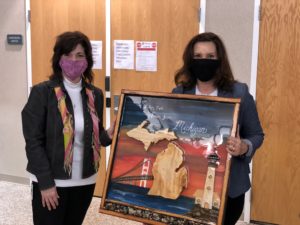 Midland’s Gransden presents artwork to governor
Midland’s Gransden presents artwork to governor
During a recent visit to Midland County’s Law Enforcement Center as part of her tour of the flooding response there, Gov. Gretchen Whitmer accepted an artwork from Midland County Administrator Bridgette Gransden. The piece was created by Linda Byrne Pingot from Pinconning.
Eaton official headlines opioid ‘lunch and learn’ program
Bill Jenkins, health care administrator for the Eaton County Sheriff’s Office, will detail his county’s anti-opioid practices during a June 4 “Lunch and Learn” webinar sponsored by Wayne State University’s Center for Behavioral Health and Justice.
To register for the free webinar from 11:30 a.m. to 12:30 p.m. on June 4, click here.
“In 2017, the Eaton County Sheriff’s Office received a Bureau of Justice Assistance grant to implement medications for opioid use disorder (MOUD) for inmates with opioid use disorder (OUD) housed in the Eaton County Jail. This webinar will inform how Eaton County developed this program, the mechanisms for referral and treatment engagement, as well as how they have sustained the program over several years.”
 Nationwide presents ‘Peyton Manning: Positioned to Win’
Nationwide presents ‘Peyton Manning: Positioned to Win’
Nationwide Retirement Solutions, a MAC sponsored program, invites county officials to a special event featuring Peyton Manning.
The Super Bowl champion will discuss how he’s dealt with adversity on and off the field on June 2 from 1 p.m. to 2 p.m. The event is free to county leaders. To register and for more information, click here.
 Staff picks
Staff picks
- Here’s when major companies say workers can return to the office (Forbes)
- Staffing issues complicate unemployment agency tech woes (Governing)
- Mapping tool shows dams under state regulation (Department of Environment, Great Lakes and Energy)
- Texas county tests remote jury trial, with some hesitations (Governing)




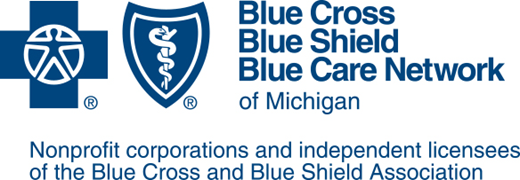


 Michigan’s Court of Claims turned aside a challenge to Gov. Gretchen Whitmer’s emergency powers under a 1945 state law in a ruling issued Thursday.
Michigan’s Court of Claims turned aside a challenge to Gov. Gretchen Whitmer’s emergency powers under a 1945 state law in a ruling issued Thursday. Aid proposals for counties and others continue to float around Capitol Hill, while the state of Michigan has nothing but grim budget news for the next two years, said MAC staffers
Aid proposals for counties and others continue to float around Capitol Hill, while the state of Michigan has nothing but grim budget news for the next two years, said MAC staffers 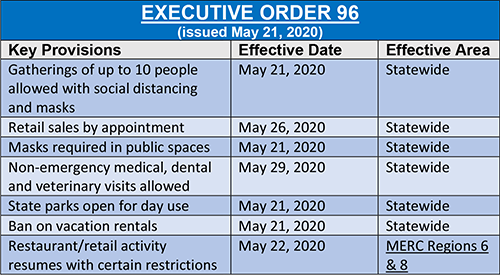
 Local road agencies could reallocate their share of state road funding dollars to the roads they determine need it the most under two bills approved by the House this week.
Local road agencies could reallocate their share of state road funding dollars to the roads they determine need it the most under two bills approved by the House this week.  A bill to provide civil and criminal immunity to health providers during the coronavirus crisis got its second hearing this week before the House Judiciary Committee.
A bill to provide civil and criminal immunity to health providers during the coronavirus crisis got its second hearing this week before the House Judiciary Committee. The National Association of Counties (NACo) will not hold its 2020 Annual Conference in July, the group’s board announced this week. Instead, the group will proceed with a virtual Annual Business Meeting, including the election for second vice president, consideration of by-laws amendments and other association business.
The National Association of Counties (NACo) will not hold its 2020 Annual Conference in July, the group’s board announced this week. Instead, the group will proceed with a virtual Annual Business Meeting, including the election for second vice president, consideration of by-laws amendments and other association business. Rural communities can apply for grants from a $12 million fund to fight opioid abuse under the Rural Communities Opioid Response Program (R-CORP), the federal Health Resources and Services Administration (HRSA) announced on May 13.
Rural communities can apply for grants from a $12 million fund to fight opioid abuse under the Rural Communities Opioid Response Program (R-CORP), the federal Health Resources and Services Administration (HRSA) announced on May 13. County leaders are invited to a June 5 webinar on how to evaluate operations and adapt them to current needs.
County leaders are invited to a June 5 webinar on how to evaluate operations and adapt them to current needs. The state has a $3.2 billion hole in its current budgets, public finance experts testified today before the state’s Consensus Revenue Estimating Conference. The conference
The state has a $3.2 billion hole in its current budgets, public finance experts testified today before the state’s Consensus Revenue Estimating Conference. The conference  Public safety workers could get $1,000 payments under the terms of
Public safety workers could get $1,000 payments under the terms of 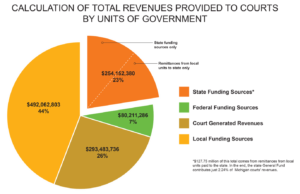 Statutory authority extending the ability for Michigan’s trial courts to levy fees, is one step closer to the governor’s desk. This week, the House Judiciary Committee unanimously approved
Statutory authority extending the ability for Michigan’s trial courts to levy fees, is one step closer to the governor’s desk. This week, the House Judiciary Committee unanimously approved  In partnership with the Michigan Association of Counties, Michigan Municipal League and Michigan Townships Association, the Michigan Department of Treasury is pleased to announce the third joint webinar, “COVID-19 Updates and Resources for Local Governments,” at 2 p.m. on Monday, May 18.
In partnership with the Michigan Association of Counties, Michigan Municipal League and Michigan Townships Association, the Michigan Department of Treasury is pleased to announce the third joint webinar, “COVID-19 Updates and Resources for Local Governments,” at 2 p.m. on Monday, May 18. The
The  Jail Task Force issues memo on gaining COVID funds
Jail Task Force issues memo on gaining COVID funds County boards may continue to hold remote sessions until June 30 under
County boards may continue to hold remote sessions until June 30 under  The Michigan Supreme Court has issued Administrative Order 2020-16, which requires courts to follow a careful, phased approach in returning to full capacity. Per the Supreme Court General Counsel, “Court plans must be based on the advice of local health experts and be approved by the State Court Administrative Office (SCAO) prior to implementation.”
The Michigan Supreme Court has issued Administrative Order 2020-16, which requires courts to follow a careful, phased approach in returning to full capacity. Per the Supreme Court General Counsel, “Court plans must be based on the advice of local health experts and be approved by the State Court Administrative Office (SCAO) prior to implementation.” Michigan is working toward testing 1 percent to 2 percent of its total population each week, Gov. Gretchen Whitmer told a virtual audience of local government leaders on Tuesday evening.
Michigan is working toward testing 1 percent to 2 percent of its total population each week, Gov. Gretchen Whitmer told a virtual audience of local government leaders on Tuesday evening. Counties need to have preparedness/response plans to comply with a state Executive Order, experts with the Michigan Municipal Risk Management Authority (MMRMA) said during a
Counties need to have preparedness/response plans to comply with a state Executive Order, experts with the Michigan Municipal Risk Management Authority (MMRMA) said during a  The Department of Environment, Great Lakes, and Energy (EGLE) has delayed permits for Enbridge to construct a tunnel to enclose the Line 5 pipeline under the Straits of Mackinac. Enbridge filed in early April for permits to begin construction next year, with a target operational date in 2024. The letter from EGLE to Enbridge can be
The Department of Environment, Great Lakes, and Energy (EGLE) has delayed permits for Enbridge to construct a tunnel to enclose the Line 5 pipeline under the Straits of Mackinac. Enbridge filed in early April for permits to begin construction next year, with a target operational date in 2024. The letter from EGLE to Enbridge can be 




